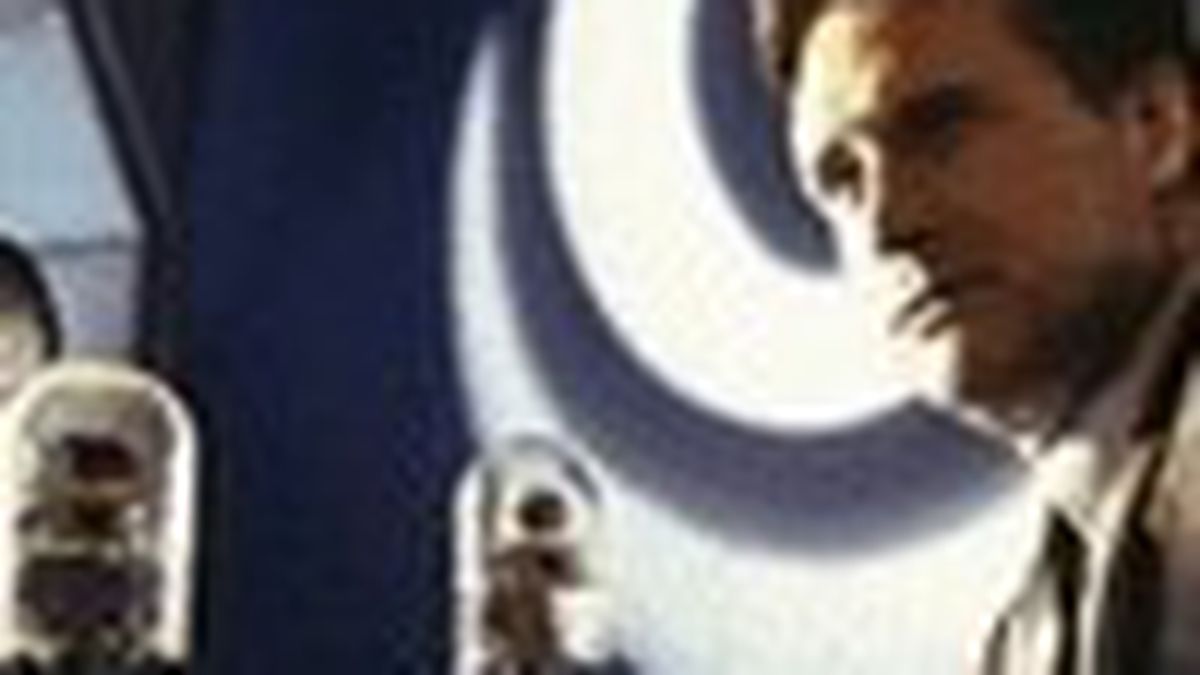Now that the real-life chicaneries at Enron and Halliburton have outsleazed anything Gordon “Greed Is Good” Gecko could dream up in Wall Street, moviemakers with a distaste for the corporate world (you know, all of them) find themselves hard-pressed to come up with a nightmare fantasy any scarier than what’s happening in broad daylight. Witness Rick, the first film directed by Curtiss Clayton (previously known as Gus Van Sant’s longtime editor), and written by Daniel Handler (better known as Lemony Snicket, the guy who turns out those popular-but-nasty children’s books). A paranoid, seriocomic portrait of a man who has sold his soul to Big Business, this is the kind of thing that might have gotten its makers hauled up before a congressional committee or two back in the McCarthy era. But in light of what Ken Lay and Company have wrought, it’s pretty weak stuff today, despite its fervent anticapitalist stance.
The protagonist here is one Rick O’Lette (Independence Day‘s Bill Pullman), a Manhattan middle manager who works for a mysterious, ill-defined company called Image. Rick lives on Park Avenue and wears nice suits, but this is one miserable wage slave. He hates Duke (Aaron Stanford), his grinning, baby-faced punk of a boss, almost as much as he hates himself, and he takes his deep-seated resentments out on whomever’s handy — unlucky underlings, a well-meaning job interviewee (Sandra Oh) whose name he can’t bother to remember, a leering bartender in a gloomy, high-tech saloon. He’s an arrested adolescent obsessed with winning, but has lost everything that matters. Predictably, Image is a sinister, marble-clad dystopia teeming with plots, shadows, and social pathologies. Brass tacks: This is The Business of Strangers meets 1984.
Mix in an evil curse, former business-school classmate Buck (Dylan Baker), who now hires out as an assassin, and nubile teenage daughter Eve (Agnes Bruckner, the traumatized poet of Blue Car), who represents the last vestige of Rick’s humanity, and the movie’s vision of a totally corrupted culture of greed and power is almost complete. We learn early on that Rick’s wife, Eve’s mother, has died. But grief is not his real problem. The clear implication is that Rick has been destroyed by dog-eat-dog capitalism itself. How long can it be before black humor succumbs to Tragedy with a capital T?
Mmmmmm. “Rick O’Lette?” A bad guy called “The Duke?” A curse? An assassin lurking in the wings? The only things we’re missing are the orchestra, the fat lady, and a couple of tenors stuffed with spaghetti puttanesca. That Handler has raided Rigoletto for his plot is one thing; write that off to outsourcing. That these moviemakers believe they are saying something new or profound about post-industrial society is quite another. Rick’s monstrosity, relieved only by his assertion that “I used to be a good person,” is suspiciously facile, and the notion that the entire American enterprise has turned into one giant Hydra bent on swallowing up the innocent is schematic and cartoonish. There’s plenty of villainy and corruption to go around in the business world, to be sure, but the sweeping pseudo-Marxism we get laid on us here rings hollow. Think Clayton and Handler will donate the profits from this artistic venture to the local food bank? Or to the heirs of Giuseppe Verdi?
That said, Rick‘s dark, Orwellian trappings can be fun, in a twisted sort of way. Buck, the executive hit man, announces that “I own my own company,” then hands out a business card that reads “My Own Company.” In this gloomy version of New York, the most prominent view we get of a bronze bull sculpture signifying financial success is from the hind end. The annual Christmas party at Image, where tragedy strikes, is a festival of social Darwinism at which the employees claw away at each other in a boozy battle for dominance. Of course, Image is not the only bad guy on the block. The other shadow companies invoked here are called Pretense, Facade, and Simulation. Business, we are instructed, is not just all-out war; it’s all-out war fought under bogus flags.
Enough. Whether they know it or not, the cynicism of these filmmakers equals that of their conflicted protagonist’s, so convinced are they that the world is irrevocably divided between sharks and their helpless prey. Rick may be a plea for humanity, spiced with satire, but it’s steeped in the same black-and-white absolutism it means to deplore. The management team at Halliburton might even love it — for all the wrong reasons.













